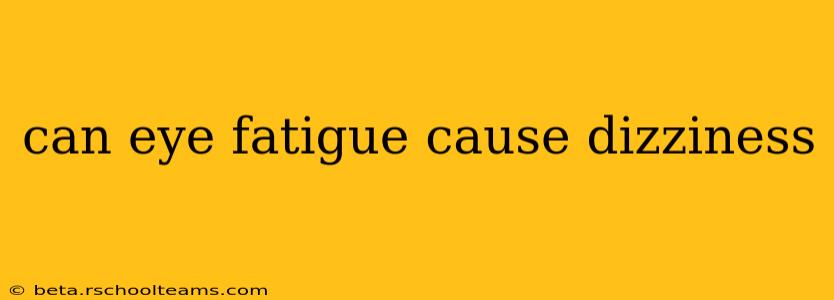Can Eye Fatigue Cause Dizziness? Understanding the Connection
Eye fatigue, that nagging feeling of tired, strained, or achy eyes, is a common complaint in today's digitally driven world. But did you know it can sometimes lead to a surprising symptom: dizziness? While not always directly causal, there's a definite link between eye strain and feelings of imbalance or vertigo that we'll explore in detail.
What is Eye Fatigue?
Before diving into the connection with dizziness, let's clarify what constitutes eye fatigue. It's more than just tired eyes; it's a condition characterized by a range of symptoms, including:
- Dry, itchy, or burning eyes: Often a result of prolonged screen time or insufficient blinking.
- Blurry vision: Difficulty focusing or seeing clearly, especially at a distance.
- Headaches: Often located around the temples or forehead.
- Neck and shoulder pain: Resulting from poor posture while working on computers or devices.
- Sensitivity to light: Discomfort when exposed to bright environments.
These symptoms arise from overuse of the eye muscles, insufficient lubrication, and the strain of focusing on near objects for extended periods.
How Can Eye Strain Lead to Dizziness?
The connection between eye fatigue and dizziness isn't always straightforward. It's not a case of one directly causing the other in every instance. However, the relationship is often linked to the brain's processing of visual information.
Our eyes constantly send visual information to the brain, which interprets this data to maintain balance and spatial orientation. When eyes are fatigued, the quality of this information can be compromised. This can lead to:
- Vertigo-like sensations: A feeling of spinning or movement, even when stationary.
- Imbalance: Difficulty maintaining your balance or feeling unsteady on your feet.
- Nausea: In some cases, dizziness from eye strain can also be accompanied by nausea.
This is particularly true for individuals already susceptible to vestibular issues (problems with the inner ear that affect balance). Eye fatigue can exacerbate these pre-existing conditions, leading to more pronounced dizziness.
Does Eye Strain Always Cause Dizziness?
It's crucial to understand that eye fatigue doesn't always cause dizziness. Many other factors can contribute to dizziness, including:
- Inner ear problems: Vestibular disorders are a common cause of dizziness.
- Migraines: Migraines can be associated with visual disturbances and dizziness.
- Medication side effects: Certain medications can list dizziness as a side effect.
- Low blood pressure: Hypotension can cause lightheadedness and dizziness.
- Dehydration: Lack of sufficient fluids can also contribute to dizziness.
Therefore, if you experience dizziness alongside eye fatigue, it's vital to consult a healthcare professional to rule out other underlying causes. They can help determine the root of your dizziness and recommend appropriate treatment.
What to Do if You Experience Eye Fatigue and Dizziness
If you're experiencing both eye fatigue and dizziness, here are some steps you can take:
- Rest your eyes: Take frequent breaks from screen time, and practice the 20-20-20 rule (every 20 minutes, look at an object 20 feet away for 20 seconds).
- Blink frequently: Consciously blink more often to lubricate your eyes.
- Use artificial tears: Over-the-counter eye drops can help alleviate dryness.
- Adjust lighting: Reduce glare and improve lighting conditions.
- Improve posture: Maintain good posture when working on computers or devices.
- Consult an eye doctor: Schedule a comprehensive eye exam to rule out any underlying eye conditions.
- Consult a doctor: If dizziness is persistent or severe, seek medical attention to rule out other potential causes.
By understanding the potential connection between eye fatigue and dizziness, you can better address your symptoms and seek appropriate medical care when needed. Remember, while eye strain might contribute to dizziness in some cases, it's vital to get a proper diagnosis to ensure you're receiving the right treatment.
